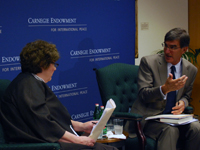{
"authors": [
"George Perkovich",
"Karen DeYoung"
],
"type": "event",
"centerAffiliationAll": "dc",
"centers": [
"Carnegie Endowment for International Peace"
],
"collections": [],
"englishNewsletterAll": "",
"nonEnglishNewsletterAll": "",
"primaryCenter": "Carnegie Endowment for International Peace",
"programAffiliation": "SAP",
"programs": [
"South Asia"
],
"projects": [],
"regions": [
"North America",
"United States",
"South Asia",
"India",
"Afghanistan",
"Pakistan"
],
"topics": [
"Security",
"Foreign Policy"
]
}
U.S. Policy Toward Pakistan
Fri, September 9th, 2011
Washington, D.C.
The United States has been a major player in Pakistan for sixty years; if Pakistan is dangerously dysfunctional, Washington helped enable it to get this way. As withdrawal from Afghanistan means that the United States will be less dependent on Pakistani supply lines, Washington has a rare opportunity to reconsider and dramatically revise its existing policies and practices in a country of great strategic importance.
Carnegie’s George Perkovich discussed ways in which the United States could redesign its approach to Pakistan after decades of empowering the nation’s hyperactive military and intelligence services at the expense of effective governance. Karen DeYoung of the Washington Post moderated.
Enabling Pakistan’s Dysfunction
- Decades of collusion: Since the early 1950s, the United States has worked with the Pakistan Army and intelligence services to advance U.S. strategic interests. Following the 9/11 attacks in 2011, Washington funded and relied on Pakistan security forces to defeat the Taliban government and drive al-Qaeda out of Afghanistan. Perkovich argued that this collusion has amounted to empowering of the Pakistan military establishment, which has directly ruled the country for more than half of its existence, without changing its obsession with contesting India. This posture is also leading Pakistan to ruin and precluding its full cooperation with U.S. objectives in Afghanistan.
- The military’s external projection: The Pakistan Army and Inter-Services Intelligence’s (ISI) obsession with India has led to over-projection of power externally and under-projection of state resources and attention to deal with internal crises, Perkovich said.
- Grave internal problems: Pakistani citizens lack a singular national identity and the institutions of a progressive modern state. Perkovich argued that the Pakistan state, led by the army, has done too little to redress domestic injustices, economic failure, and poor governance. These problems would remain grave even if India did not exist and cannot be effectively redressed as long as the Army dominates the political economy.
A Necessary Strategic Shift
- Need for democratization: If Pakistanis are more justly governed, more educated, more employed, and more able to define and pursue a constructive national identity and interest, they will expunge terrorists to secure their own futures, Perkovich asserted.
- The struggle is theirs: There is little the United States can or should try to do to organize Pakistani progressives. Perkovich contended that the most important ways the United States can help the Pakistanis is to stop enabling the nation’s dysfunctional actors and to diminish the U.S. footprint in Pakistan and fingerprints on civilian assistance.
Recommendations for U.S. Policymakers
- Stop pushing Pakistan to fight America’s battles: Perkovich argued that the United States should recognize the futility of demanding that the Pakistan army enter North Waziristan. If Washington stops pressing Islamabad to conduct military operations along the Afghan border, it can also withdraw the pledge of billions of dollars in military assistance to support operations in this theater. If Pakistanis do not welcome the mission, they do not need the funding for it, he added.
- Stop blocking Pakistani imports: Pakistani goods currently suffer from extremely high tariffs, making it difficult for Pakistan to compete with other low-income, textile-producing nations. Perkovich contended that the United States should lower tariffs on Pakistani textiles and apparel to help attract investment and spur economic growth. Most of the ensuing Pakistani imports into the United States would displace products from China and other Asian suppliers, rather than American producers.
- Stop over-indulging India: The United States needs to correct the impression that Pakistani interests and lives mean less than those of Indians, Perkovich said. When Indians are killed by terrorists linked to Pakistan, Washington rightly decries the loss of life and demands that Pakistan bring the perpetrators to justice. The United States must be similarly vocal when Pakistanis and Muslims are killed in Kashmir and other parts of India.
- Reinvent U.S. aid to Pakistan: American aid to Pakistan is deeply unpopular in Islamabad for its heavy-handed requirements and in Washington for its seeming ineffectiveness. In order to better meet the needs of both sides, Perkovich suggested that the United States temporarily pause assistance to Pakistan in order to explore alternative models, such as establishing a resource bank – staffed by multi-national experts – to review and fund local development projects
Carnegie does not take institutional positions on public policy issues; the views represented herein are those of the author(s) and do not necessarily reflect the views of Carnegie, its staff, or its trustees.
Event Speakers
George Perkovich is the Japan Chair for a World Without Nuclear Weapons and a senior fellow in the Carnegie Endowment for International Peace’s Nuclear Policy Program. He works primarily on nuclear deterrence, nonproliferation, and disarmament issues, and is leading a study on nuclear signaling in the 21st century.
Karen DeYoung
